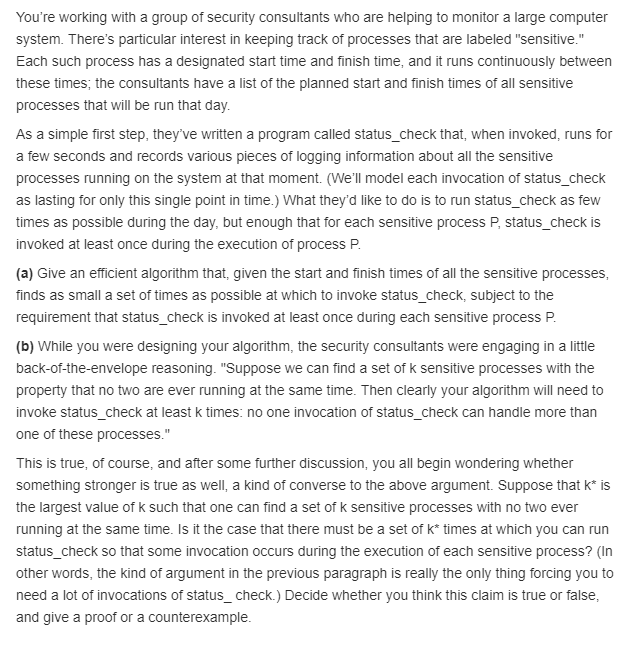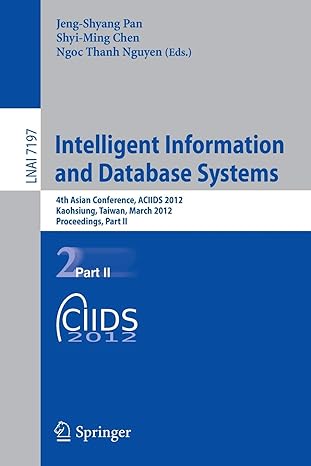I need help with part B.

You're working with a group of security consultants who are helping to monitor a large computer system. There's particular interest in keeping track of processes that are labeled "sensitive." Each such process has a designated start time and finish time, and it runs continuously between these times, the consultants have a list of the planned start and finish times of all sensitive processes that will be run that day As a simple first step, they've written a program called status_check that, when invoked, runs for a few seconds and records various pieces of logging information about all the sensitive processes running on the system at that moment. (We'll model each invocation of status_check as lasting for only this single point in time.) What they'd like to do is to run status_check as few times as possible during the day, but enough that for each sensitive process P, status_check is invoked at least once during the execution of process P. (a) Give an efficient algorithm that, given the start and finish times of all the sensitive processes finds as small a set of times as possible at which to invoke status_check, subject to the requirement that status_check is invoked at least once during each sensitive process P. (b) While you were designing your algorithm, the security consultants were engaging in a little back-of-the-envelope reasoning. "Suppose we can find a set of k sensitive processes with the property that no two are ever running at the same time. Then clearly your algorithm will need to invoke status_check at least k times: no one invocation of status_check can handle more than one of these processes." This is true, of course, and after some further discussion, you all begin wondering whether something stronger is true as well, a kind of converse to the above argument. Suppose that k* is the largest value of k such that one can find a set of k sensitive processes with no two ever running at the same time. Is it the case that there must be a set of k* times at which you can run status_check so that some invocation occurs during the execution of each sensitive process? (In other words, the kind of argument in the previous paragraph is really the only thing forcing you to need a lot of invocations of status_check.) Decide whether you think this claim is true or false and give a proof or a counterexample You're working with a group of security consultants who are helping to monitor a large computer system. There's particular interest in keeping track of processes that are labeled "sensitive." Each such process has a designated start time and finish time, and it runs continuously between these times, the consultants have a list of the planned start and finish times of all sensitive processes that will be run that day As a simple first step, they've written a program called status_check that, when invoked, runs for a few seconds and records various pieces of logging information about all the sensitive processes running on the system at that moment. (We'll model each invocation of status_check as lasting for only this single point in time.) What they'd like to do is to run status_check as few times as possible during the day, but enough that for each sensitive process P, status_check is invoked at least once during the execution of process P. (a) Give an efficient algorithm that, given the start and finish times of all the sensitive processes finds as small a set of times as possible at which to invoke status_check, subject to the requirement that status_check is invoked at least once during each sensitive process P. (b) While you were designing your algorithm, the security consultants were engaging in a little back-of-the-envelope reasoning. "Suppose we can find a set of k sensitive processes with the property that no two are ever running at the same time. Then clearly your algorithm will need to invoke status_check at least k times: no one invocation of status_check can handle more than one of these processes." This is true, of course, and after some further discussion, you all begin wondering whether something stronger is true as well, a kind of converse to the above argument. Suppose that k* is the largest value of k such that one can find a set of k sensitive processes with no two ever running at the same time. Is it the case that there must be a set of k* times at which you can run status_check so that some invocation occurs during the execution of each sensitive process? (In other words, the kind of argument in the previous paragraph is really the only thing forcing you to need a lot of invocations of status_check.) Decide whether you think this claim is true or false and give a proof or a counterexample







